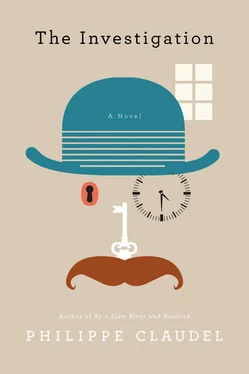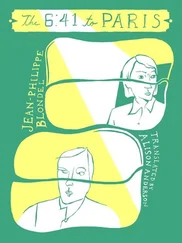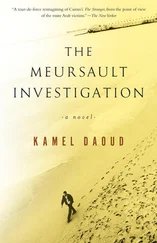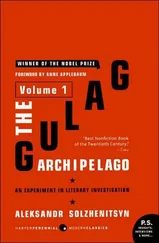“Have you finished?” the Psychologist asked.
“Yes, I think so. I don’t have anything to add, at least not at the moment.”
The Investigator had spoken for almost an hour. Talking had done him good. He felt that the Psychologist could understand him. Now the Psychologist got off his wheeled stool and went to sit behind the desk. He opened a drawer and took out an index card and a promotional ballpoint pen on which the Investigator thought he recognized the photograph of the Old Man, but the reproduction was so small that he couldn’t be sure. The Psychologist jotted down a few words the Investigator was unable to read.
“Your name, please?” The Psychologist kept his head down and his eyes on the index card, doubtless assuming that the reply to his question would come too quickly to warrant raising his head and looking at the person across the desk.
“My name?”
“Yes.”
His head still lowered, the Psychologist was holding his pen ready to write down the Investigator’s name; the ballpoint hovered an inch above the card.
“My name … my name …?” the Investigator stammered, making an immense effort that he tried to hide behind a smile. In spite of himself, what he produced seemed rather like a grimace.
The Psychologist slowly raised his head and looked across the desk. His face betrayed not the slightest emotion, not the smallest thought inclined this way or that. In other words, it was impossible at that moment to know what the Psychologist thought about the Investigator or about the Investigator’s hesitation in giving his name. Only the fact of his having lifted his head, that is, of his having swapped a banal attitude for one a little less so, one that suggested a more intense — more intrigued? — attention, indicated that the time the Investigator was taking to reply to him constituted, in his opinion, an opinion given weight by his status as a clinician and supported by his knowledge and long professional experience (he was not in his first youth), an almost imperceptible break with normality.
Meanwhile, the Investigator was losing his footing, sinking in quicksand, experiencing something whose existence he’d always doubted. For years, he’d filed quicksand in the same mental drawer that contained Aladdin’s lamp, flying carpets, Scheherazade’s stories, and Sinbad’s Cyclops. He’d heard about all those things, but they’d remained hearsay. Legends and stories had never interested him. He did without them. He left all that to children. He was wrong.
“You don’t remember your name?”
THE INVESTIGATOR BURST OUT LAUGHING. It was a big laugh, protracted and supple, and he made it last as long as possible, hoping that the Psychologist would find this slightly artificial good humor infectious and join him in modulating to a brighter key. But the longer the laugh went on, the more forced it in fact became; and the harder the Investigator tried to keep it up, to infuse it with new variations, the more rigid the Psychologist’s face grew, and the more it changed into a dull, unyielding surface, as cold as a rock, as impenetrable as granite.
The Psychologist placed his pen on the index card, and then the Investigator stopped laughing. He knew he’d lost. His thoughts started to race about in his head, rushing in every direction like creatures trapped in a circular room, dashing around it, charging its walls, crashing into them, rebounding, howling, injuring themselves, calling out, begging for deliverance, or at least for a response. He was searching. He was searching for his name. The name that was written on his identity papers. A simple action would have sufficed, a glance at a little plastic card bearing his photograph with his name printed under it. Could he have forgotten his own name? Was this among the consequences of his accident with the wall? You don’t forget your name! He must have said it a dozen times since his arrival in the City. Of course! He thought about that, passed in review all his encounters with other people — they hadn’t been so numerous — and tried to remember how he’d presented himself to them. “I’m the Investigator.” “Hello, I’m the Investigator.” “Let me introduce myself: I’m the Investigator.” The sentences followed one after another, all of them identical or nearly so. The Investigator recalled that he always designated himself as the Investigator, which happened to be precisely what he was. But he gave no name. No name at all. Ever.
“I’m the Investigator,” he finally said to the Psychologist, raising his shoulders and letting them fall at once by way of apology for the obviousness of his assertion.
The Psychologist stood up, returned to his rolling stool, sat on it, and scooted over to a spot very close to the Investigator. His hard face softened somewhat, and when he began to speak again, his voice was mild.
“Are you aware that you’ve talked of nothing but functions ever since the beginning of our session? You’re the Investigator, and you refer to the Policeman, the Guide, the Watchman, the Server, the Guard, the Manager, the Security Officer, the Founder. You never use proper names, not for yourself or anyone else. Sometimes you add a numerical adornment — you’re number 14, you’re number 93—but it comes down to the same thing. Answer this simple question: Who am I to you?”
“You’re the Psychologist. You told me so.”
“No. I told you I was a psychologist, not the Psychologist. Besides, you seem not to have noticed that I’m a woman, and your failure to observe this obvious fact confirms my analysis. You deny all humanity, in yourself and in those around you. You see people and the world as an impersonal, asexual system of functions, of cogs and gears, a great mechanism without intelligence in which those functions and cogs operate and interact in order to make it work. When you refer to a group, it’s always vague, it has no precise limits. You mention the Enterprise, the Crowd, the Tourists, the Displacees, nebulous entities one doesn’t know whether to take literally or metaphorically.”
“What about the Giantess?” the Investigator cried, full of hope, as if he’d retrieved the blessed formula for sending an SOS, even though he could feel that his ship was already almost completely submerged.
“The Giantess,” the Psychologist repeated, smiling one of those smiles bestowed on a person who’s having trouble understanding even though he’s been provided with all the elements he needs to understand. “The Giantess is also the Mother, your Mother, as simple as that. Or you might as well have said the Woman. Here again, you designate someone by function, and the exaggeration of the function that can be seen in your use of the word ‘Giantess’ simply transcribes the oppression you seem to feel when faced with the feminine, and perhaps also the fantasy of being dominated by it, enveloped by it, of returning by a sort of reverse childbirth into the greater, the first, the ancestral womb, as a way of escaping a world in which you find it difficult to win, or to keep, your proper place.”
The Giantess, his Mother! His Mother, to whose womb he dreamed of returning. This woman was mad! To prove it, the Investigator couldn’t even remember his Mother’s face.
“Moreover, this is the reason why you were wearing women’s undergarments, isn’t it?”
“I beg your pardon?”
The Psychologist rolled his stool over to a small cabinet, opened one of its drawers, thrust his hand inside, and pulled out the pink panties with the black lace trim. He waved this article of clothing in the air for a few seconds before letting it drop back into the drawer, which he closed with a flick of his fingers.
“I can explain everything …” stammered the humiliated Investigator.
Читать дальше












